Reflections on Patient Care: A Chronic Illness Case Study of John
VerifiedAdded on 2023/06/04
|7
|2064
|201
Case Study
AI Summary
This case study reflects on the care provided to John, a 70-year-old patient with a history of type 2 diabetes and recent hyperglycemia symptoms. The reflection covers feelings experienced during consultation, including sympathy and hope, and evaluates the care provided, highlighting the importance of ethical considerations and family involvement. The analysis explores the burdens of diabetes on older adults and emphasizes the significance of professionalism and holistic care. Key learnings include the importance of ethics in language, confidentiality, and the value of family support. The action plan outlines strategies for improved consultation time, patient education, cultural sensitivity, and expanded knowledge in working with elderly patients with complex needs. Desklib offers a range of resources, including solved assignments and past papers, to support students in their studies.
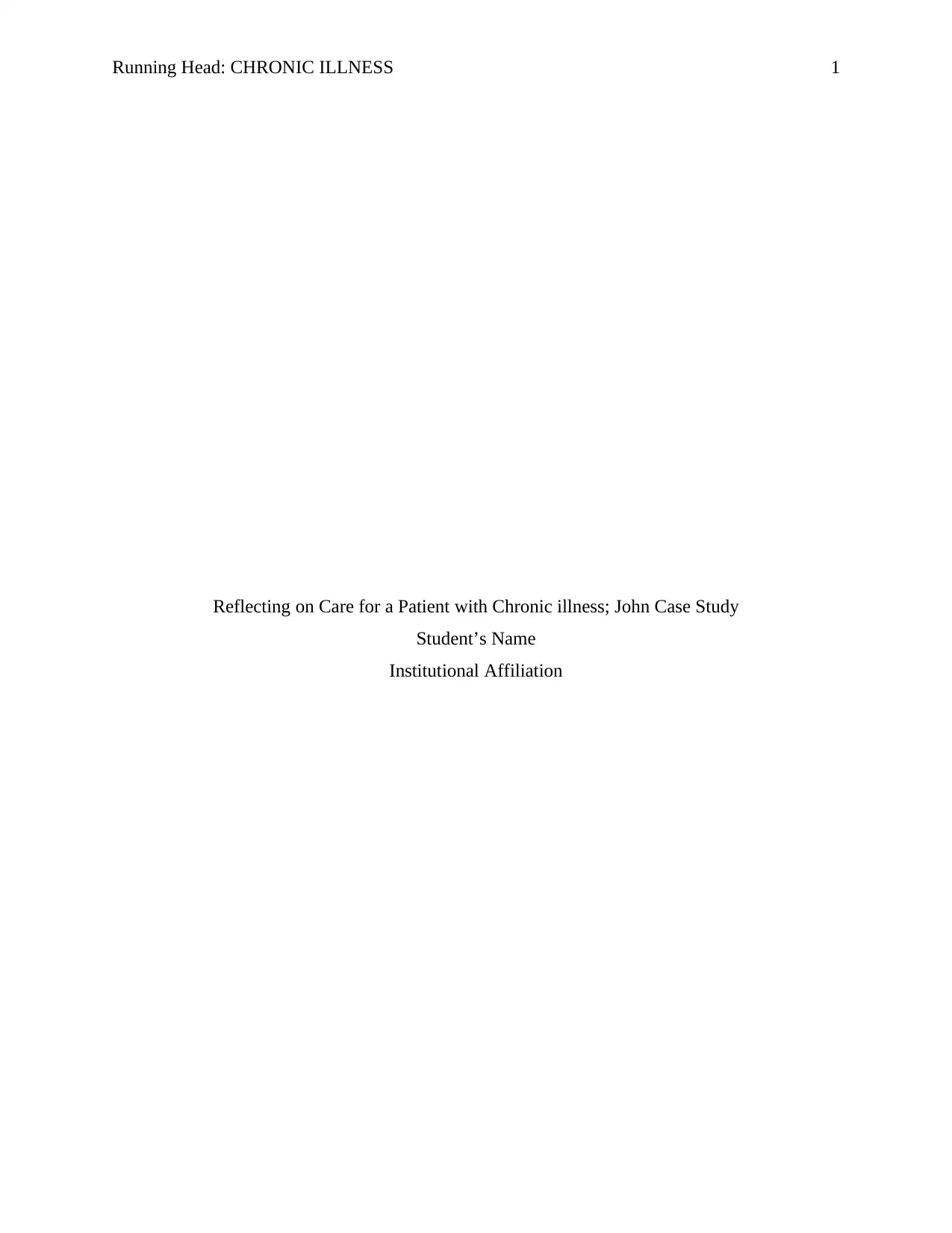
Running Head: CHRONIC ILLNESS 1
Reflecting on Care for a Patient with Chronic illness; John Case Study
Student’s Name
Institutional Affiliation
Reflecting on Care for a Patient with Chronic illness; John Case Study
Student’s Name
Institutional Affiliation
Paraphrase This Document
Need a fresh take? Get an instant paraphrase of this document with our AI Paraphraser
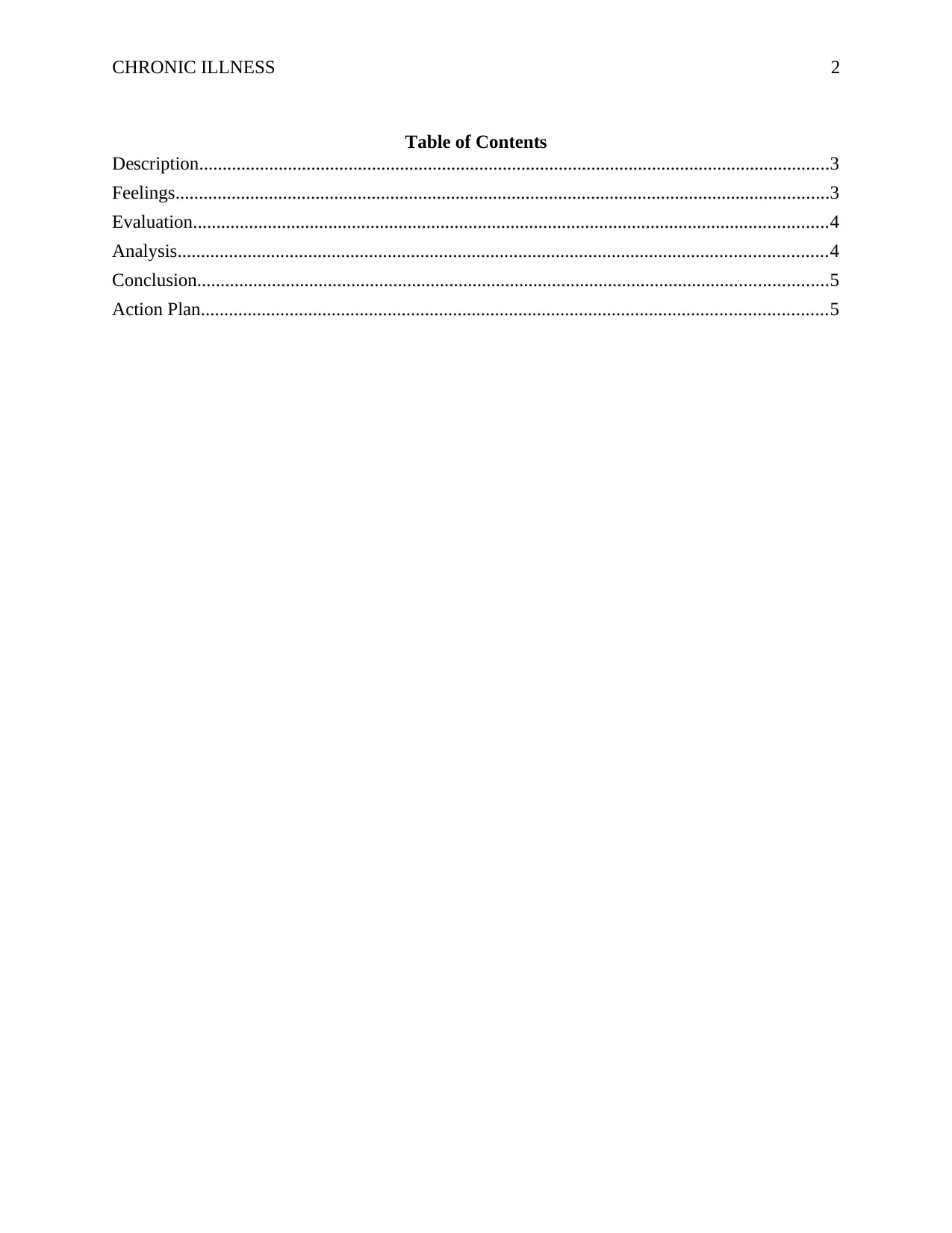
CHRONIC ILLNESS 2
Table of Contents
Description.......................................................................................................................................3
Feelings............................................................................................................................................3
Evaluation........................................................................................................................................4
Analysis...........................................................................................................................................4
Conclusion.......................................................................................................................................5
Action Plan......................................................................................................................................5
Table of Contents
Description.......................................................................................................................................3
Feelings............................................................................................................................................3
Evaluation........................................................................................................................................4
Analysis...........................................................................................................................................4
Conclusion.......................................................................................................................................5
Action Plan......................................................................................................................................5
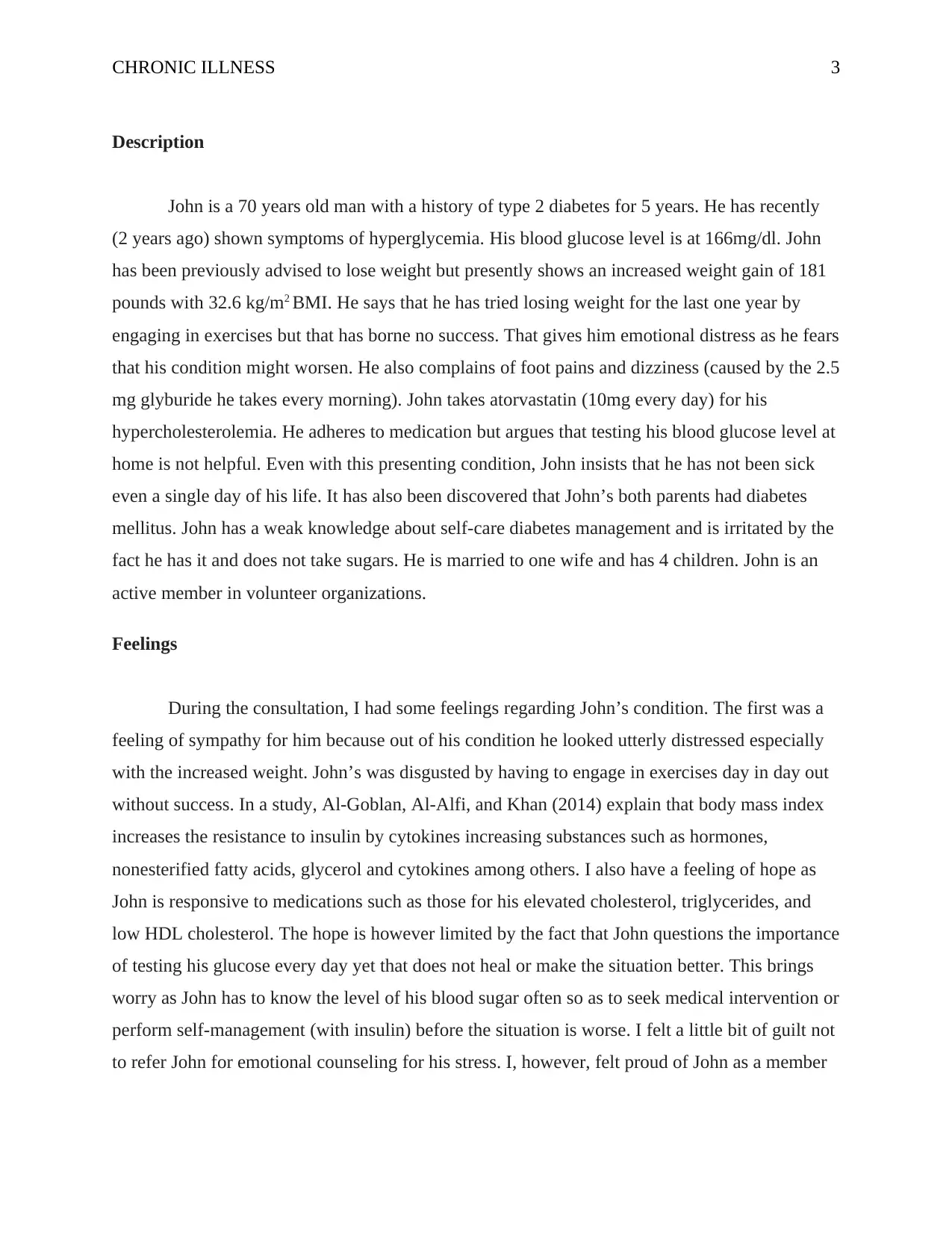
CHRONIC ILLNESS 3
Description
John is a 70 years old man with a history of type 2 diabetes for 5 years. He has recently
(2 years ago) shown symptoms of hyperglycemia. His blood glucose level is at 166mg/dl. John
has been previously advised to lose weight but presently shows an increased weight gain of 181
pounds with 32.6 kg/m2 BMI. He says that he has tried losing weight for the last one year by
engaging in exercises but that has borne no success. That gives him emotional distress as he fears
that his condition might worsen. He also complains of foot pains and dizziness (caused by the 2.5
mg glyburide he takes every morning). John takes atorvastatin (10mg every day) for his
hypercholesterolemia. He adheres to medication but argues that testing his blood glucose level at
home is not helpful. Even with this presenting condition, John insists that he has not been sick
even a single day of his life. It has also been discovered that John’s both parents had diabetes
mellitus. John has a weak knowledge about self-care diabetes management and is irritated by the
fact he has it and does not take sugars. He is married to one wife and has 4 children. John is an
active member in volunteer organizations.
Feelings
During the consultation, I had some feelings regarding John’s condition. The first was a
feeling of sympathy for him because out of his condition he looked utterly distressed especially
with the increased weight. John’s was disgusted by having to engage in exercises day in day out
without success. In a study, Al-Goblan, Al-Alfi, and Khan (2014) explain that body mass index
increases the resistance to insulin by cytokines increasing substances such as hormones,
nonesterified fatty acids, glycerol and cytokines among others. I also have a feeling of hope as
John is responsive to medications such as those for his elevated cholesterol, triglycerides, and
low HDL cholesterol. The hope is however limited by the fact that John questions the importance
of testing his glucose every day yet that does not heal or make the situation better. This brings
worry as John has to know the level of his blood sugar often so as to seek medical intervention or
perform self-management (with insulin) before the situation is worse. I felt a little bit of guilt not
to refer John for emotional counseling for his stress. I, however, felt proud of John as a member
Description
John is a 70 years old man with a history of type 2 diabetes for 5 years. He has recently
(2 years ago) shown symptoms of hyperglycemia. His blood glucose level is at 166mg/dl. John
has been previously advised to lose weight but presently shows an increased weight gain of 181
pounds with 32.6 kg/m2 BMI. He says that he has tried losing weight for the last one year by
engaging in exercises but that has borne no success. That gives him emotional distress as he fears
that his condition might worsen. He also complains of foot pains and dizziness (caused by the 2.5
mg glyburide he takes every morning). John takes atorvastatin (10mg every day) for his
hypercholesterolemia. He adheres to medication but argues that testing his blood glucose level at
home is not helpful. Even with this presenting condition, John insists that he has not been sick
even a single day of his life. It has also been discovered that John’s both parents had diabetes
mellitus. John has a weak knowledge about self-care diabetes management and is irritated by the
fact he has it and does not take sugars. He is married to one wife and has 4 children. John is an
active member in volunteer organizations.
Feelings
During the consultation, I had some feelings regarding John’s condition. The first was a
feeling of sympathy for him because out of his condition he looked utterly distressed especially
with the increased weight. John’s was disgusted by having to engage in exercises day in day out
without success. In a study, Al-Goblan, Al-Alfi, and Khan (2014) explain that body mass index
increases the resistance to insulin by cytokines increasing substances such as hormones,
nonesterified fatty acids, glycerol and cytokines among others. I also have a feeling of hope as
John is responsive to medications such as those for his elevated cholesterol, triglycerides, and
low HDL cholesterol. The hope is however limited by the fact that John questions the importance
of testing his glucose every day yet that does not heal or make the situation better. This brings
worry as John has to know the level of his blood sugar often so as to seek medical intervention or
perform self-management (with insulin) before the situation is worse. I felt a little bit of guilt not
to refer John for emotional counseling for his stress. I, however, felt proud of John as a member
⊘ This is a preview!⊘
Do you want full access?
Subscribe today to unlock all pages.

Trusted by 1+ million students worldwide
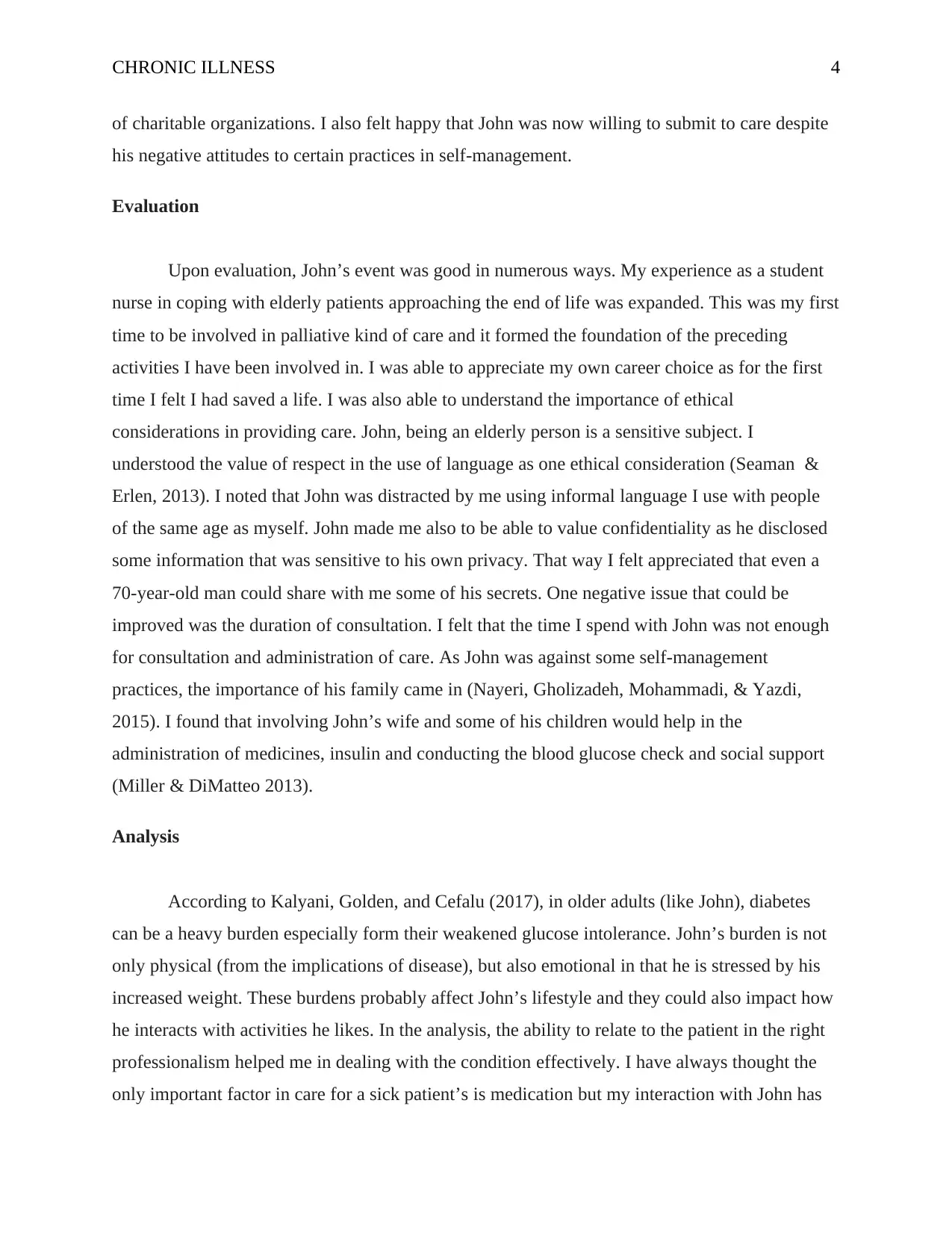
CHRONIC ILLNESS 4
of charitable organizations. I also felt happy that John was now willing to submit to care despite
his negative attitudes to certain practices in self-management.
Evaluation
Upon evaluation, John’s event was good in numerous ways. My experience as a student
nurse in coping with elderly patients approaching the end of life was expanded. This was my first
time to be involved in palliative kind of care and it formed the foundation of the preceding
activities I have been involved in. I was able to appreciate my own career choice as for the first
time I felt I had saved a life. I was also able to understand the importance of ethical
considerations in providing care. John, being an elderly person is a sensitive subject. I
understood the value of respect in the use of language as one ethical consideration (Seaman &
Erlen, 2013). I noted that John was distracted by me using informal language I use with people
of the same age as myself. John made me also to be able to value confidentiality as he disclosed
some information that was sensitive to his own privacy. That way I felt appreciated that even a
70-year-old man could share with me some of his secrets. One negative issue that could be
improved was the duration of consultation. I felt that the time I spend with John was not enough
for consultation and administration of care. As John was against some self-management
practices, the importance of his family came in (Nayeri, Gholizadeh, Mohammadi, & Yazdi,
2015). I found that involving John’s wife and some of his children would help in the
administration of medicines, insulin and conducting the blood glucose check and social support
(Miller & DiMatteo 2013).
Analysis
According to Kalyani, Golden, and Cefalu (2017), in older adults (like John), diabetes
can be a heavy burden especially form their weakened glucose intolerance. John’s burden is not
only physical (from the implications of disease), but also emotional in that he is stressed by his
increased weight. These burdens probably affect John’s lifestyle and they could also impact how
he interacts with activities he likes. In the analysis, the ability to relate to the patient in the right
professionalism helped me in dealing with the condition effectively. I have always thought the
only important factor in care for a sick patient’s is medication but my interaction with John has
of charitable organizations. I also felt happy that John was now willing to submit to care despite
his negative attitudes to certain practices in self-management.
Evaluation
Upon evaluation, John’s event was good in numerous ways. My experience as a student
nurse in coping with elderly patients approaching the end of life was expanded. This was my first
time to be involved in palliative kind of care and it formed the foundation of the preceding
activities I have been involved in. I was able to appreciate my own career choice as for the first
time I felt I had saved a life. I was also able to understand the importance of ethical
considerations in providing care. John, being an elderly person is a sensitive subject. I
understood the value of respect in the use of language as one ethical consideration (Seaman &
Erlen, 2013). I noted that John was distracted by me using informal language I use with people
of the same age as myself. John made me also to be able to value confidentiality as he disclosed
some information that was sensitive to his own privacy. That way I felt appreciated that even a
70-year-old man could share with me some of his secrets. One negative issue that could be
improved was the duration of consultation. I felt that the time I spend with John was not enough
for consultation and administration of care. As John was against some self-management
practices, the importance of his family came in (Nayeri, Gholizadeh, Mohammadi, & Yazdi,
2015). I found that involving John’s wife and some of his children would help in the
administration of medicines, insulin and conducting the blood glucose check and social support
(Miller & DiMatteo 2013).
Analysis
According to Kalyani, Golden, and Cefalu (2017), in older adults (like John), diabetes
can be a heavy burden especially form their weakened glucose intolerance. John’s burden is not
only physical (from the implications of disease), but also emotional in that he is stressed by his
increased weight. These burdens probably affect John’s lifestyle and they could also impact how
he interacts with activities he likes. In the analysis, the ability to relate to the patient in the right
professionalism helped me in dealing with the condition effectively. I have always thought the
only important factor in care for a sick patient’s is medication but my interaction with John has
Paraphrase This Document
Need a fresh take? Get an instant paraphrase of this document with our AI Paraphraser
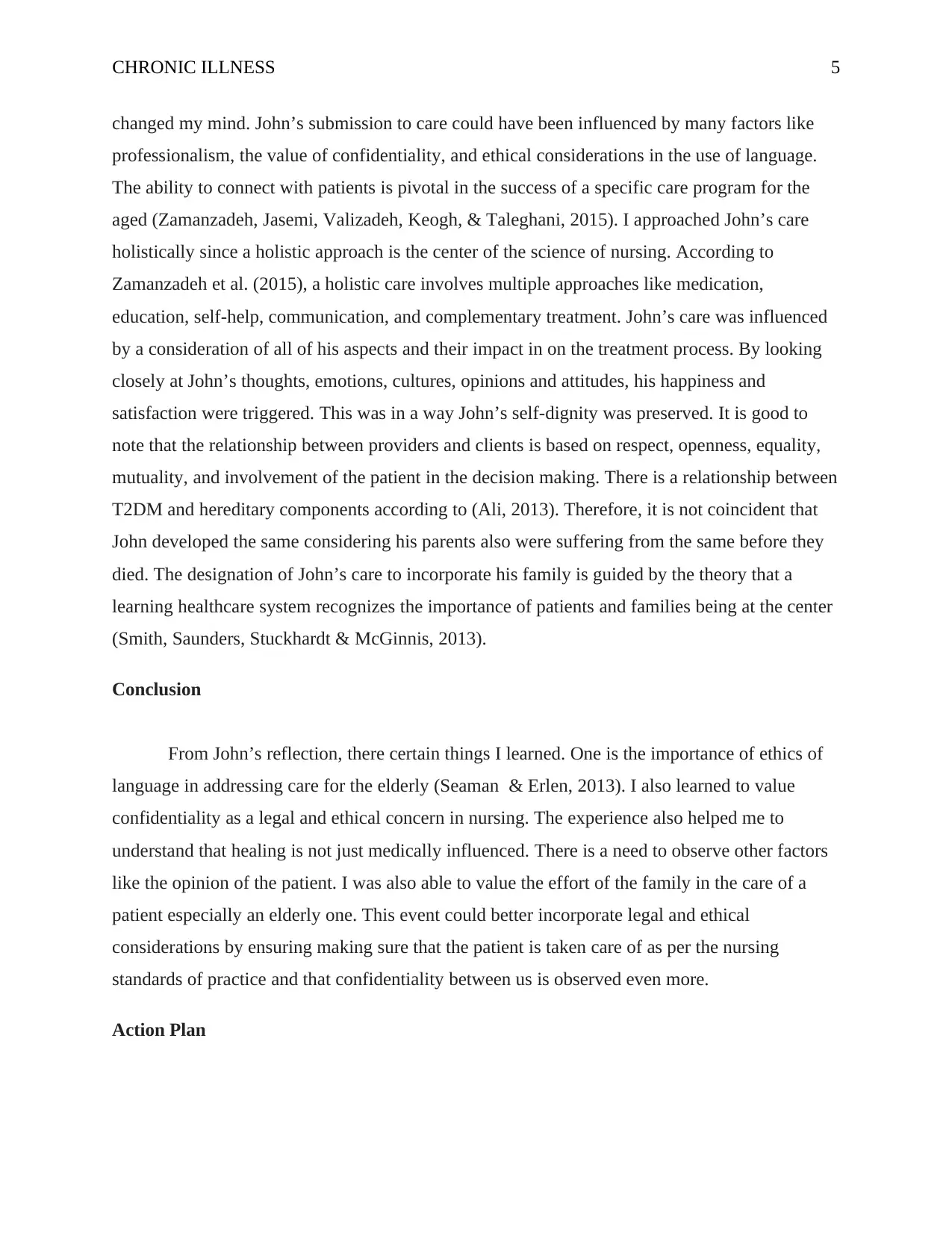
CHRONIC ILLNESS 5
changed my mind. John’s submission to care could have been influenced by many factors like
professionalism, the value of confidentiality, and ethical considerations in the use of language.
The ability to connect with patients is pivotal in the success of a specific care program for the
aged (Zamanzadeh, Jasemi, Valizadeh, Keogh, & Taleghani, 2015). I approached John’s care
holistically since a holistic approach is the center of the science of nursing. According to
Zamanzadeh et al. (2015), a holistic care involves multiple approaches like medication,
education, self-help, communication, and complementary treatment. John’s care was influenced
by a consideration of all of his aspects and their impact in on the treatment process. By looking
closely at John’s thoughts, emotions, cultures, opinions and attitudes, his happiness and
satisfaction were triggered. This was in a way John’s self-dignity was preserved. It is good to
note that the relationship between providers and clients is based on respect, openness, equality,
mutuality, and involvement of the patient in the decision making. There is a relationship between
T2DM and hereditary components according to (Ali, 2013). Therefore, it is not coincident that
John developed the same considering his parents also were suffering from the same before they
died. The designation of John’s care to incorporate his family is guided by the theory that a
learning healthcare system recognizes the importance of patients and families being at the center
(Smith, Saunders, Stuckhardt & McGinnis, 2013).
Conclusion
From John’s reflection, there certain things I learned. One is the importance of ethics of
language in addressing care for the elderly (Seaman & Erlen, 2013). I also learned to value
confidentiality as a legal and ethical concern in nursing. The experience also helped me to
understand that healing is not just medically influenced. There is a need to observe other factors
like the opinion of the patient. I was also able to value the effort of the family in the care of a
patient especially an elderly one. This event could better incorporate legal and ethical
considerations by ensuring making sure that the patient is taken care of as per the nursing
standards of practice and that confidentiality between us is observed even more.
Action Plan
changed my mind. John’s submission to care could have been influenced by many factors like
professionalism, the value of confidentiality, and ethical considerations in the use of language.
The ability to connect with patients is pivotal in the success of a specific care program for the
aged (Zamanzadeh, Jasemi, Valizadeh, Keogh, & Taleghani, 2015). I approached John’s care
holistically since a holistic approach is the center of the science of nursing. According to
Zamanzadeh et al. (2015), a holistic care involves multiple approaches like medication,
education, self-help, communication, and complementary treatment. John’s care was influenced
by a consideration of all of his aspects and their impact in on the treatment process. By looking
closely at John’s thoughts, emotions, cultures, opinions and attitudes, his happiness and
satisfaction were triggered. This was in a way John’s self-dignity was preserved. It is good to
note that the relationship between providers and clients is based on respect, openness, equality,
mutuality, and involvement of the patient in the decision making. There is a relationship between
T2DM and hereditary components according to (Ali, 2013). Therefore, it is not coincident that
John developed the same considering his parents also were suffering from the same before they
died. The designation of John’s care to incorporate his family is guided by the theory that a
learning healthcare system recognizes the importance of patients and families being at the center
(Smith, Saunders, Stuckhardt & McGinnis, 2013).
Conclusion
From John’s reflection, there certain things I learned. One is the importance of ethics of
language in addressing care for the elderly (Seaman & Erlen, 2013). I also learned to value
confidentiality as a legal and ethical concern in nursing. The experience also helped me to
understand that healing is not just medically influenced. There is a need to observe other factors
like the opinion of the patient. I was also able to value the effort of the family in the care of a
patient especially an elderly one. This event could better incorporate legal and ethical
considerations by ensuring making sure that the patient is taken care of as per the nursing
standards of practice and that confidentiality between us is observed even more.
Action Plan
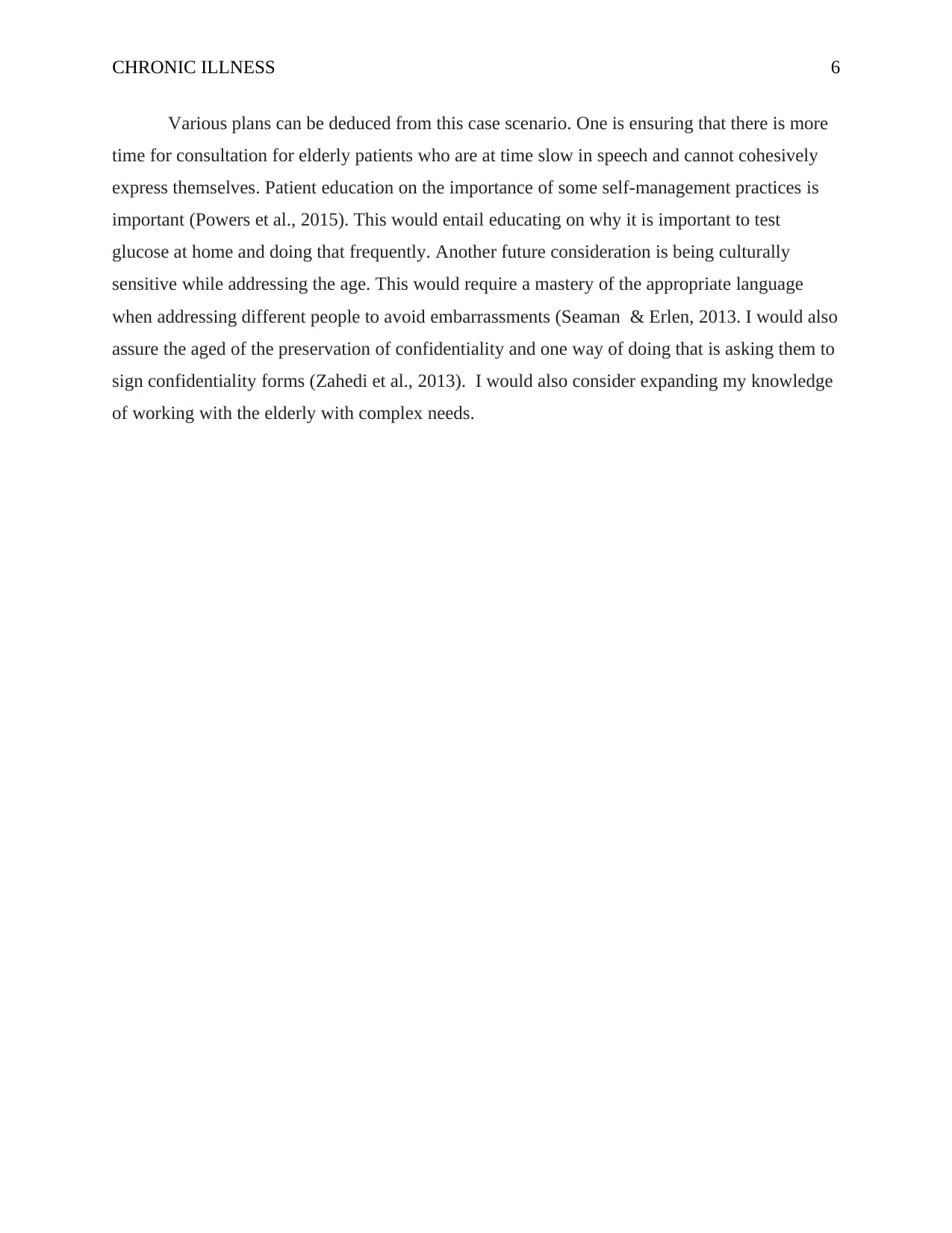
CHRONIC ILLNESS 6
Various plans can be deduced from this case scenario. One is ensuring that there is more
time for consultation for elderly patients who are at time slow in speech and cannot cohesively
express themselves. Patient education on the importance of some self-management practices is
important (Powers et al., 2015). This would entail educating on why it is important to test
glucose at home and doing that frequently. Another future consideration is being culturally
sensitive while addressing the age. This would require a mastery of the appropriate language
when addressing different people to avoid embarrassments (Seaman & Erlen, 2013. I would also
assure the aged of the preservation of confidentiality and one way of doing that is asking them to
sign confidentiality forms (Zahedi et al., 2013). I would also consider expanding my knowledge
of working with the elderly with complex needs.
Various plans can be deduced from this case scenario. One is ensuring that there is more
time for consultation for elderly patients who are at time slow in speech and cannot cohesively
express themselves. Patient education on the importance of some self-management practices is
important (Powers et al., 2015). This would entail educating on why it is important to test
glucose at home and doing that frequently. Another future consideration is being culturally
sensitive while addressing the age. This would require a mastery of the appropriate language
when addressing different people to avoid embarrassments (Seaman & Erlen, 2013. I would also
assure the aged of the preservation of confidentiality and one way of doing that is asking them to
sign confidentiality forms (Zahedi et al., 2013). I would also consider expanding my knowledge
of working with the elderly with complex needs.
⊘ This is a preview!⊘
Do you want full access?
Subscribe today to unlock all pages.

Trusted by 1+ million students worldwide
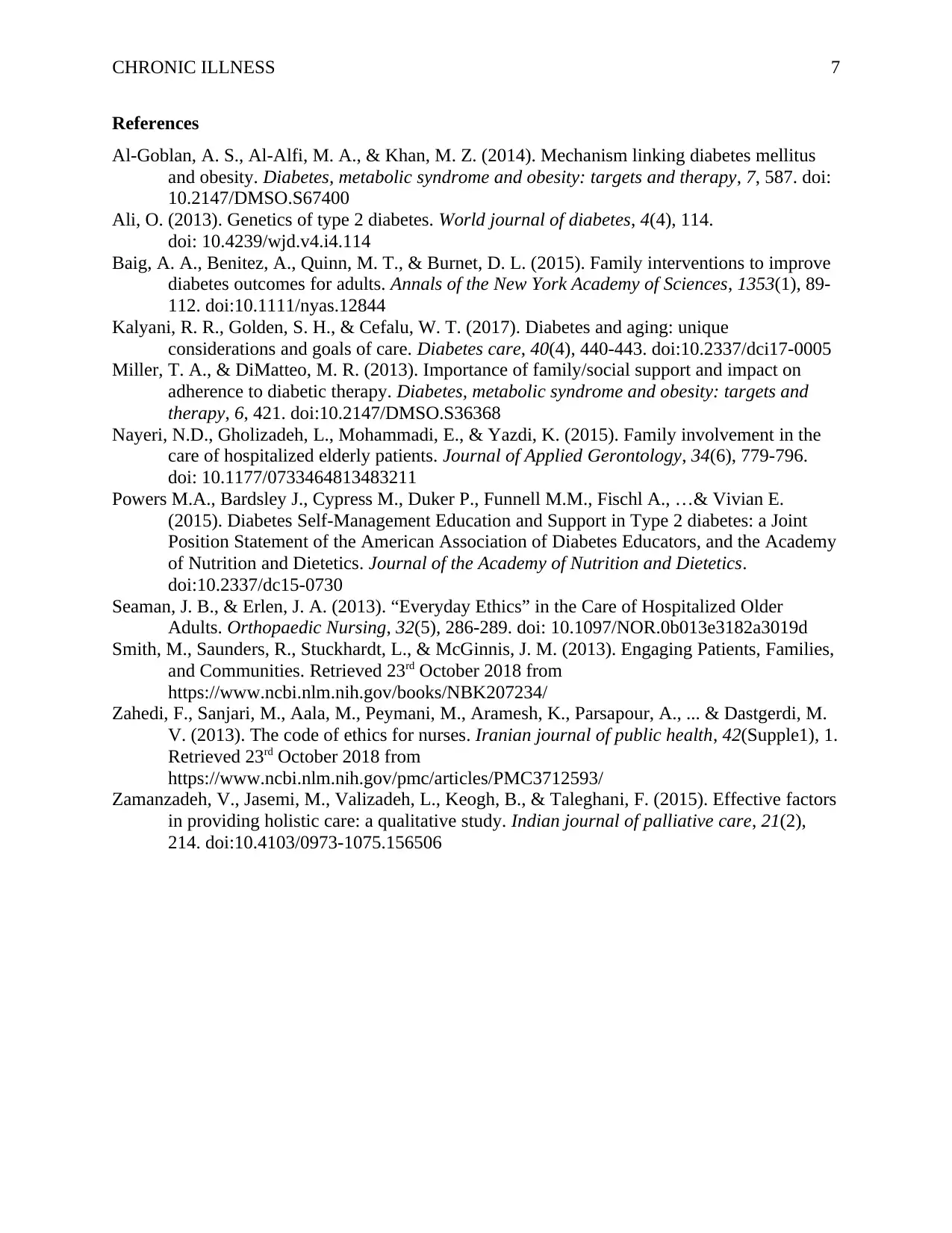
CHRONIC ILLNESS 7
References
Al-Goblan, A. S., Al-Alfi, M. A., & Khan, M. Z. (2014). Mechanism linking diabetes mellitus
and obesity. Diabetes, metabolic syndrome and obesity: targets and therapy, 7, 587. doi:
10.2147/DMSO.S67400
Ali, O. (2013). Genetics of type 2 diabetes. World journal of diabetes, 4(4), 114.
doi: 10.4239/wjd.v4.i4.114
Baig, A. A., Benitez, A., Quinn, M. T., & Burnet, D. L. (2015). Family interventions to improve
diabetes outcomes for adults. Annals of the New York Academy of Sciences, 1353(1), 89-
112. doi:10.1111/nyas.12844
Kalyani, R. R., Golden, S. H., & Cefalu, W. T. (2017). Diabetes and aging: unique
considerations and goals of care. Diabetes care, 40(4), 440-443. doi:10.2337/dci17-0005
Miller, T. A., & DiMatteo, M. R. (2013). Importance of family/social support and impact on
adherence to diabetic therapy. Diabetes, metabolic syndrome and obesity: targets and
therapy, 6, 421. doi:10.2147/DMSO.S36368
Nayeri, N.D., Gholizadeh, L., Mohammadi, E., & Yazdi, K. (2015). Family involvement in the
care of hospitalized elderly patients. Journal of Applied Gerontology, 34(6), 779-796.
doi: 10.1177/0733464813483211
Powers M.A., Bardsley J., Cypress M., Duker P., Funnell M.M., Fischl A., …& Vivian E.
(2015). Diabetes Self-Management Education and Support in Type 2 diabetes: a Joint
Position Statement of the American Association of Diabetes Educators, and the Academy
of Nutrition and Dietetics. Journal of the Academy of Nutrition and Dietetics.
doi:10.2337/dc15-0730
Seaman, J. B., & Erlen, J. A. (2013). “Everyday Ethics” in the Care of Hospitalized Older
Adults. Orthopaedic Nursing, 32(5), 286-289. doi: 10.1097/NOR.0b013e3182a3019d
Smith, M., Saunders, R., Stuckhardt, L., & McGinnis, J. M. (2013). Engaging Patients, Families,
and Communities. Retrieved 23rd October 2018 from
https://www.ncbi.nlm.nih.gov/books/NBK207234/
Zahedi, F., Sanjari, M., Aala, M., Peymani, M., Aramesh, K., Parsapour, A., ... & Dastgerdi, M.
V. (2013). The code of ethics for nurses. Iranian journal of public health, 42(Supple1), 1.
Retrieved 23rd October 2018 from
https://www.ncbi.nlm.nih.gov/pmc/articles/PMC3712593/
Zamanzadeh, V., Jasemi, M., Valizadeh, L., Keogh, B., & Taleghani, F. (2015). Effective factors
in providing holistic care: a qualitative study. Indian journal of palliative care, 21(2),
214. doi:10.4103/0973-1075.156506
References
Al-Goblan, A. S., Al-Alfi, M. A., & Khan, M. Z. (2014). Mechanism linking diabetes mellitus
and obesity. Diabetes, metabolic syndrome and obesity: targets and therapy, 7, 587. doi:
10.2147/DMSO.S67400
Ali, O. (2013). Genetics of type 2 diabetes. World journal of diabetes, 4(4), 114.
doi: 10.4239/wjd.v4.i4.114
Baig, A. A., Benitez, A., Quinn, M. T., & Burnet, D. L. (2015). Family interventions to improve
diabetes outcomes for adults. Annals of the New York Academy of Sciences, 1353(1), 89-
112. doi:10.1111/nyas.12844
Kalyani, R. R., Golden, S. H., & Cefalu, W. T. (2017). Diabetes and aging: unique
considerations and goals of care. Diabetes care, 40(4), 440-443. doi:10.2337/dci17-0005
Miller, T. A., & DiMatteo, M. R. (2013). Importance of family/social support and impact on
adherence to diabetic therapy. Diabetes, metabolic syndrome and obesity: targets and
therapy, 6, 421. doi:10.2147/DMSO.S36368
Nayeri, N.D., Gholizadeh, L., Mohammadi, E., & Yazdi, K. (2015). Family involvement in the
care of hospitalized elderly patients. Journal of Applied Gerontology, 34(6), 779-796.
doi: 10.1177/0733464813483211
Powers M.A., Bardsley J., Cypress M., Duker P., Funnell M.M., Fischl A., …& Vivian E.
(2015). Diabetes Self-Management Education and Support in Type 2 diabetes: a Joint
Position Statement of the American Association of Diabetes Educators, and the Academy
of Nutrition and Dietetics. Journal of the Academy of Nutrition and Dietetics.
doi:10.2337/dc15-0730
Seaman, J. B., & Erlen, J. A. (2013). “Everyday Ethics” in the Care of Hospitalized Older
Adults. Orthopaedic Nursing, 32(5), 286-289. doi: 10.1097/NOR.0b013e3182a3019d
Smith, M., Saunders, R., Stuckhardt, L., & McGinnis, J. M. (2013). Engaging Patients, Families,
and Communities. Retrieved 23rd October 2018 from
https://www.ncbi.nlm.nih.gov/books/NBK207234/
Zahedi, F., Sanjari, M., Aala, M., Peymani, M., Aramesh, K., Parsapour, A., ... & Dastgerdi, M.
V. (2013). The code of ethics for nurses. Iranian journal of public health, 42(Supple1), 1.
Retrieved 23rd October 2018 from
https://www.ncbi.nlm.nih.gov/pmc/articles/PMC3712593/
Zamanzadeh, V., Jasemi, M., Valizadeh, L., Keogh, B., & Taleghani, F. (2015). Effective factors
in providing holistic care: a qualitative study. Indian journal of palliative care, 21(2),
214. doi:10.4103/0973-1075.156506
1 out of 7
Related Documents
Your All-in-One AI-Powered Toolkit for Academic Success.
+13062052269
info@desklib.com
Available 24*7 on WhatsApp / Email
![[object Object]](/_next/static/media/star-bottom.7253800d.svg)
Unlock your academic potential
Copyright © 2020–2026 A2Z Services. All Rights Reserved. Developed and managed by ZUCOL.



